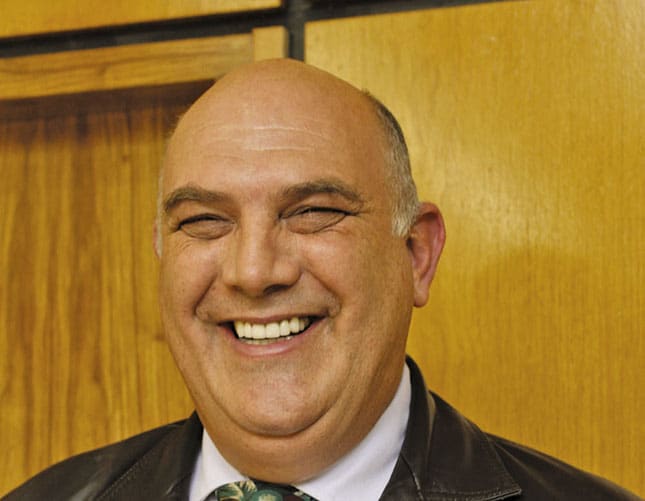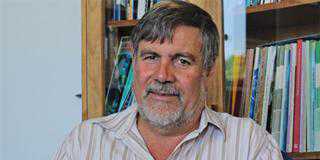
Photo: FW Archive
Did you anticipate that you would be voted out at the AgriSA congress?
No, I didn’t see it coming. Although, in hindsight, there were a few people who tried to warn me. It’s easier to take a blow if you are braced, but I take comfort in what Mohammad Karaan said to me before the elections: “Sometime during your career as a farmers’ leader you will be sacrificed, there’s nothing you can do about that. What you can do something about is what you are sacrificed for.”
READ:Grain SA rejects land reform without compensation
The greatest moment of my career in organised agriculture, until now, was when the land reform proposal plan was adopted by all the affiliations of Agri SA. It seemed that the day of general agreement would never come, particularly as some parties showed fierce opposition to the plan only a few weeks prior to the congress. So it was inspirational and enlightening to see the plan adopted. And even better to harvest the fruit of that when Minister Gugile Nkwinti [Department of Rural Development and Land Reform] wholeheartedly accepted the very first properly mandated plan we presented to him.
There seems to be some opposition, even hostile resistance, to your leadership role in AgriSA. Can you comment on this?
In every organisation you’ll find differences of opinion. In fact, wherever people gather to meet, discuss and exchange views, you’ll find opinions as diverse as the individuals who are present. The role of leaders is to find unity and illuminate the path ahead, without imposing conformity.
In AgriSA we deal with particularly sensitive issues, so naturally there will be robust exchange and at times tension will increase. This is the natural course of events. Personally, I don’t place much value on the art of the hidden agenda and my views are absolutely clear. In my experience, there are some ‘hotspots’ where the potential for conflict is higher than in other zones.
What are these ‘hotspots’?
Firstly, let us deal with the Constitution. I think commercial farmers can be financially hurt and even lose part of their balance sheet within the parameters of the Constitution. This idea has evoked some fairly strong opposition. Agricultural expansion into the rest of Africa could be seen as another zone of disagreement. Some organisations in the sector do not see African expansion as an opportunity for South Africa’s farmers, but rather as a threat to markets.
While I understand the concerns, I don’t believe they are valid in the long term. The advantages of opening agri-businesses in the sub-Saharan region are well-known and as an advocate of the free-market system I openly encourage agricultural expansion into Africa. During the past two decades, there have been groups in agriculture across South Africa that have been holding on to a belief that it is not the responsibility of farmers to address or solve the problems around land reform.
Government must be accountable and deliver the right package, they say. For me, there is no question that farmers, agribusiness and organised agriculture must get involved and work with government to reform and transform. There is also further potential for conflict in carrying out the transformation mandate. The meaning of transformation, if not corrupted, has been somewhat lost in translation. I’m openly opposed to the idea that worthwhile transformation can be accomplished simply by appointing a black person.
This type of cosmetic change, in which a white face is replaced with a black one, will not bring about a fundamentally transformed society or sector.
Which lessons have you learnt in agri-politics and negotiations with government during the last five years?
I’ve learnt that negotiation is a process with no end and that the product of negotiation is not a signature at the bottom of an agreement. The supreme skill is not to outwit and outsmart, but to acquire and hold onto patience. It takes humility, grit and persistence to build and maintain firm trust relationships. And this does not mean that you have to be soft on anyone; it often means you have to be as direct and frank as possible. Sincerity is critical – despite the smiles and the small talk, a phony move or word is spotted in an instant. Politicians are apt not to trust one anyway. You have to be able to tell them that they have made a real mess of something without being intimidated in any way.
Have you ever told a politician that he or she has made a mess of some process?
Yes, many times, especially on the re-opening of land claims.
What has been your single biggest challenge in organised agriculture up to now?
Convincing farmers can be enormously difficult. There’s no such thing as a stupid farmer – those who are still farming are there because they’re at the top of their game. Unfortunately, many farmers don’t read as much as they should, so using the written word as a means of communication is not necessarily an effective way of getting a point across.
Farmers want to hear from their leaders and they want to be able to question them. They like to take advantage of an opportunity to interrogate their representatives. Of course, farmers are the captains of their own ships, and they are used to being in charge. The biggest challenge is persuading them to take a direction that may be different from the one they are used to. On the positive side, a farmer is generally a sucker for a good plan.
I’ve never attended a meeting where I had to convince farmers of the credibility and value of this land reform proposal, for example, and failed to get their approval. But then, in vast areas of our country I had no opportunity to engage with farmers. At some point, communities in organised agriculture must admit there’s a problem and be willing to allow healthy interaction and the free flow of ideas.
What regrets do you have about your career in organised agriculture?
I don’t spend enough time at home with my family or on my farm. When I go there now, it almost feels like a holiday. Many of us have regrets about losing time with our children because of busy working lives. But you come to realise that the time you’ve lost can’t be bought back.
What is the single biggest obstacle to successful land reform?
Competency within the department is our Achilles’ heel. We can have the best plans, the best legislation, but without competent officials we will not make land reform work. Cadre deployment is a major problem. Prof Mohammad Karaan, who has been involved in the National Development Plan, wants to have a special purpose vehicle, an agency for land reform, staffed by people from the private sector.
Karaan would like banks and agribusinesses to second personnel to the agency to adjudicate business plans and monitor evaluation. Taking this route would bypass the problem of cadre deployment, but obviously there’s resistance to the proposal from inside the department.
Can you give our readers a glimpse into your future?
I’m keen to look at membership expansion and perhaps the need to launch new farmers’ associations. Some of our members are experts at launching new farmers’ associations and putting them in place with best-practice models. Black farmers are involved in the commodity organisations but not to the same extent in farmers’ associations, and we need to look at this. Do black farmers want their own structures or are they willing to join existing organisations? This requires discussion and negotiation. AgriSA could gain an opportunity here to broaden its operational base through grassroots membership.
It’s an exciting time and even if it’s the last thing I do, I want to be part of a move that helps to ensure a healthy sub-structure for the organisation.
Email Dr Theo de Jager at [email protected].
This article was originally published in the 5 December 2014 issue of Farmer’s Weekly.













